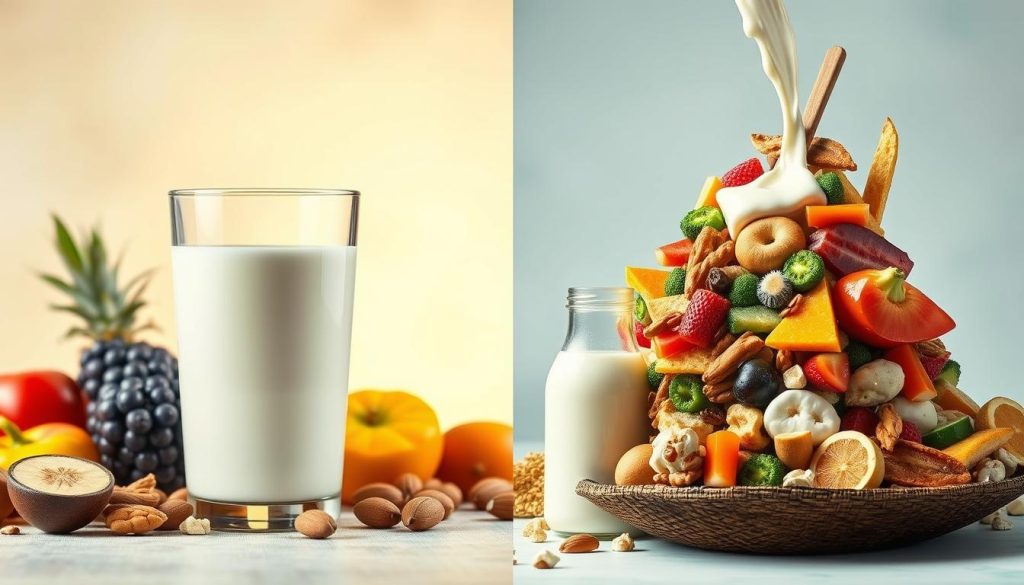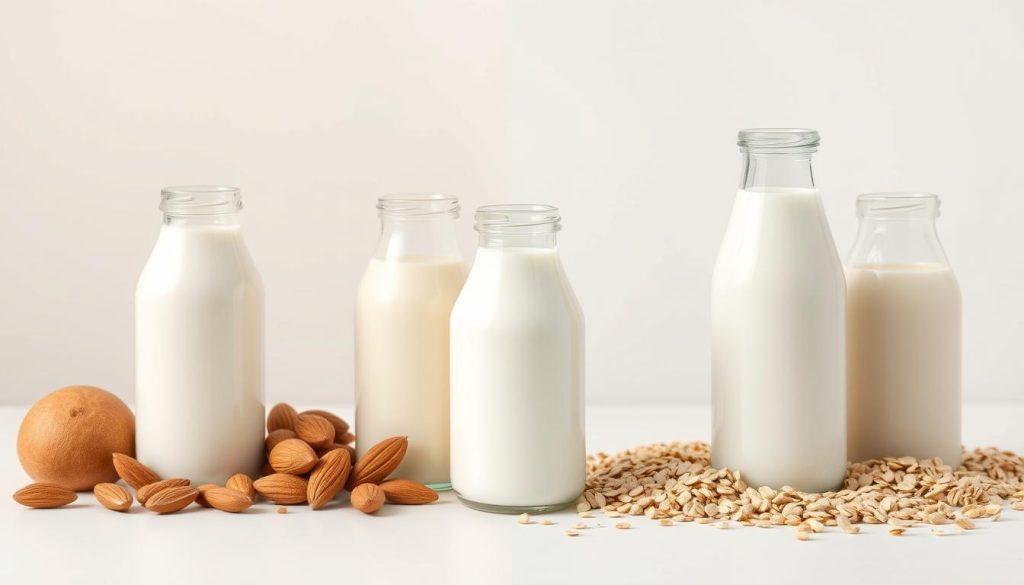Dairy products, like whole milk, often face health scrutiny. The big question is: Will whole milk make you fat? It’s key to know how whole milk affects our bodies and weight. This isn’t just a diet trend; it’s about how whole milk impacts our fitness and health.
The talk about dairy and weight is full of mixed messages. We’ll look into whole milk’s nutrition and if it really causes weight gain. Our goal is to understand the link between whole milk and body weight based on science.
Let’s keep an open mind as we explore this topic. The truth might not be a simple ‘yes’ or ‘no.’ It could depend on our diet, health, and how our bodies react. This article aims to clear up the myths about whole milk and its effects on our bodies.
Understanding Whole Milk and Its Nutritional Content
Whole milk is known for its rich taste and creamy texture. It’s also talked about in terms of full fat milk weight gain and whole milk consumption and weight control. Knowing what’s in whole milk is key for making smart food choices, like managing weight and staying healthy.
Whole milk has more fat than skim milk, which makes it higher in calories. One cup of whole milk has about 150 calories and 8 grams of fat, with 5 grams being saturated. Skim milk, on the other hand, has 80 calories and almost no fat. But, whole milk also has more Omega-3 fatty acids, which are good for your heart.
Whole milk is also a good source of protein, with about 8 grams per serving. This helps with muscle repair and growth. It’s also rich in calcium, vitamins D and A, which are important for bones, immune system, and vision.
| Nutrient | Whole Milk | Skim Milk |
|---|---|---|
| Calories | 150 | 80 |
| Total Fat (g) | 8 | 0 |
| Saturated Fat (g) | 5 | 0 |
| Protein (g) | 8 | 8 |
| Calcium (mg) | 300 | 300 |
| Vitamin D (IU) | 100 | 120 |
| Vitamin A (IU) | 500 | 500 |
| Omega-3 Fatty Acids (mg) | 75 | 2.5 |
The link between whole milk consumption and weight control comes from its protein and fat. These can make you feel full longer, helping you eat less throughout the day. But, the high calorie and fat in whole milk can also lead to weight gain if not consumed in moderation.
When looking at whole milk in your diet, it’s important to balance it with other foods and your lifestyle. This way, you can enjoy its benefits without gaining too much weight. Everyone’s body is different, so getting advice that fits your needs is important.
Debunking Myths: Will Whole Milk Make You Fat?
Many think whole milk makes you gain weight because of its saturated fat. But, recent talks about dairy and weight management say this isn’t true. Let’s look into how saturated fats in dairy work with our bodies.

The talk about saturated fat and weight gain is complex. Whole milk might not be as bad as people think. Here’s what it really does:
- Whole milk has a good mix of energy, protein, and fat. This can help you feel full and control hunger.
- The fat in whole milk might slow down sugar absorption. This can keep blood sugar levels steady.
- Dairy fats help us absorb vitamins A, D, E, and K. These vitamins are key for our health.
Studies show that full-fat dairy can be good when part of a balanced diet. Here’s how fat in different milks affects weight:
| Type of Milk | Total Fat (grams per serving) | Impact on Weight Management |
|---|---|---|
| Whole Milk | 8 | Potentially positive – can enhance satiety |
| Skim Milk | 0 | Less satiating, which could lead to increased overall intake |
| 2% Milk | 5 | Moderate, balancing calorie intake with satiety |
To really understand whole milk, we need to look at the big picture of dairy and weight management. Focusing on saturated fat and weight gain is too simple. We should look at how it fits into our whole diet for better weight control.
The Role of Saturated Fat in Full Fat Milk
Full fat milk often gets talked about because of its saturated fat. People worry it might lead to weight gain and affect how our bodies work. Let’s look into the details of saturated fats in whole milk and clear up some myths.
Decoding the Fat Content: Is it All Bad?
Saturated fats have gotten a bad rap because of links to heart disease and weight gain. But, new research shows that milk fat might not be as bad as we thought. It could even have good effects on our metabolism.
Saturated Fat vs. Unsaturated Fat: What’s in Your Milk?
It’s important to know what kinds of fats are in milk. Milk has both saturated and unsaturated fats. Let’s break it down:
- Saturated Fat: Found mainly in whole milk, it can raise LDL cholesterol but also boost HDL, which is good.
- Unsaturated Fat: Includes fats that are good for your heart and help keep cholesterol levels stable.
The mix of fats in milk makes it creamy and tasty. It also helps nourish our bodies and supports our metabolism. The question is, does it really cause saturated fat and weight gain problems, or is it not as bad as thought?
Talking about milk fats wouldn’t be complete without talking about how they’re broken down. Milk fat has short- and medium-chain fatty acids. These give quick energy and are less likely to turn into body fat. This is different from the longer chain fatty acids in meats, which are more likely to be stored as fat.
In short, full fat milk has more saturated fat than low-fat or non-fat versions. But, it also has good nutrients and health benefits. Talking more about this can help people decide if full fat milk is right for them.
Total Calories in Whole Milk and Weight Gain Correlation
Let’s talk about full fat milk weight gain. First, we need to look at calories. Whole milk has about 150 calories in an 8-ounce serving. It has 8 grams of fat, 8 grams of protein, and 13 grams of carbs. This makes it a topic of interest for those worried about will whole milk make you fat.
The link between whole milk and weight gain is complex. It depends on your diet, lifestyle, and how your body processes food. For many, adding whole milk to a balanced diet doesn’t lead to weight gain. It can actually be a healthy choice.

- Moderate Consumption: Drinking full fat milk in moderation gives you important nutrients without adding too many calories.
- High-Calorie Diets: If you already eat a lot of calories, adding whole milk might lead to weight gain.
- Active Lifestyles: People who are active might find the extra calories in full fat milk helpful. It can help with energy and muscle recovery.
This creates a question: will whole milk make you fat? The answer is yes, if you don’t balance it with a controlled diet and stay active. Those who do are unlikely to see weight gain from just full fat milk.
Here are the calories in different sizes of whole milk. This shows how important portion sizes are:
| Serving Size | Calories |
|---|---|
| 1 cup (8 oz) | 150 |
| 1/2 cup (4 oz) | 75 |
| 2 cups (16 oz) | 300 |
In summary, the fear that will whole milk make you fat is common. But it’s important to think about your diet, portion sizes, and lifestyle. With the right approach, whole milk can be part of a healthy diet without harming your weight.
Whole Milk Consumption and Weight Control Strategies
Understanding how to add whole milk to your diet is key for dairy and weight management. It’s not true that will whole milk make you fat. When eaten wisely, it can be part of a healthy diet.
To enjoy whole milk without gaining weight, moderation is essential. Here are some tips to make the most of this nutritious dairy:
- Stick to 8 ounces per serving to manage calories.
- Pair whole milk with foods high in fiber or whole grains for a balanced meal.
- Drink whole milk after workouts to help with recovery thanks to its protein and nutrients.
Adding whole milk to your diet can actually help with dairy and weight management goals. It’s not about gaining weight. Instead, it’s about enjoying it as part of a balanced diet.
How the Body Processes Dairy: Metabolism of Milk Fat
It’s important to know how the body breaks down dairy, like whole milk. This helps us understand its impact on weight and health. The way milk fat is digested, absorbed, and processed is key to how well we use these nutrients.
The Impact of Dietary Fat on Metabolism
Dietary fats in whole milk are at the heart of its metabolic effects. These fats, mainly saturated, have sparked debate over diet and health. Yet, recent research shows they might not be as bad as thought.
When we eat these fats, our body breaks them down into smaller pieces. It can then use these pieces for energy or save them for later. This process helps keep blood sugar stable and provides energy over time, aiding in weight control.
Whole Milk and Hormonal Effects on Weight Management
Hormones play a big part in how our body uses fats from whole milk. Milk fat affects hormones like insulin and leptin. These hormones control our metabolism and how hungry we feel.
This hormonal connection might explain why whole milk affects weight. When part of a balanced diet, it can make us feel fuller. This could lead to eating fewer calories and better weight management.
Dairy and Weight Management: The Bigger Picture
The role of dairy and weight management goes beyond whole milk. Different dairy products have different effects on our bodies. This is key to understanding how these foods impact our health and weight.
Research shows that dairy can be part of a healthy diet without causing weight gain. This knowledge helps us see the bigger picture of nutrition. It shows how different types of dairy meet different dietary needs. Learn more about this topic.
| Dairy Product | Calories | Total Fat (g) |
|---|---|---|
| Whole Milk | 150 | 8 |
| Skim Milk | 80 | 0.2 |
| Yogurt (Low-fat) | 154 | 3.8 |
| Cheese (Cheddar) | 113 | 9.4 |
Looking closer, dairy and weight management are closely connected. The choice between low-fat and full-fat dairy matters. Each type of dairy, from cheese to yogurt, has its own benefits. They can affect weight management in different ways, based on our diet and health.
- Whole milk is rich in nutrients like calcium, vitamin D, and protein. It balances calories and fat.
- Skim milk is a low-fat option, great for diets that watch calories.
- Yogurt is full of probiotics, which help with digestion and might help with weight.
- Cheese, eaten in moderation, adds flavor and helps us feel full, which can prevent overeating.
Knowing about all the dairy options helps us make better diet choices. It lets us pick the right dairy for our nutritional needs and weight goals.
Comparing Whole Milk to Non-Dairy Alternatives
More people are choosing non-dairy options over whole milk for better weight management. This change is due to the nutritional differences and perceived benefits of these alternatives. We’ll look at how these options compare to whole milk and their impact on weight.
Nutritional Profile of Plant-Based Milks
Plant-based milks like almond, soy, and oat milk offer unique nutritional benefits. Soy milk, for example, has a lot of protein like whole milk but less fat. It’s great for those focusing on dairy and weight management.
Almond milk has fewer calories and less protein but is packed with vitamin E. Oat milk is known for its fiber and creamy texture, perfect for whole grain diets.

Choosing the Right Milk for Your Weight Goals
Choosing the right milk is key for weight management. Almond milk is good for those trying to lose weight because it’s low in calories. Soy milk, with its high protein and moderate fat, is better for building muscle or increasing energy.
It’s important to look at more than just calories. Consider the overall nutritional value, including minerals, vitamins, and sugars. This helps choose the best milk for your diet and body composition.
Remember to think about your digestive health and any dietary restrictions when picking a milk. Each alternative has its own nutrients that need to match your health needs and weight goals.
Effects of Whole Milk on Body Composition
Whole milk’s impact on the body is key to understanding weight management and body fat. It’s a rich source of nutrients, sparking debate on its high-fat content’s effects on health. Does it help or hinder our bodily well-being?
Recent studies show whole milk might actually be good for body composition, unlike the common thought that dairy fat leads to weight gain. Its high-fat and protein content could help keep muscle mass and regulate body fat.
- Increased Muscle Mass: Whole milk’s protein supports muscle repair and growth.
- Better Weight Management: Whole milk might control hunger, leading to less calorie intake.
Looking into these points helps us see if whole milk is part of a balanced diet for better body composition. Yet, it’s vital to think about our unique dietary needs and how whole milk fits into our diet.
An informed approach to whole milk and weight control can greatly impact body composition through diet.
Is Whole Milk to Blame? Other Factors in Weight Gain
Many people wonder if full fat milk weight gain is a big deal. But it’s important to look at all the factors that can lead to weight gain. We need to think about more than just whole milk. Lifestyle and genetics also play big roles in how our bodies look.
There are many things that can affect weight gain, not just whole milk. Our daily habits and genetics are more important. Things like what we eat, how active we are, and our environment can have a bigger impact than milk.
- Dietary Patterns: What we eat every day matters more than any single food. Eating too many calories and not enough nutrients can lead to weight gain, even without dairy.
- Physical Activity Levels: Being active helps burn calories and control weight, no matter what we drink. Sitting too much is a big risk for being overweight.
- Genetic Predisposition: Our genes affect how we process food and store fat. People can react differently to the same diet, including dairy.
- Environmental Influences: Having access to healthy foods versus processed ones can greatly affect our health and weight.
To understand how these factors compare to full fat milk and weight concerns, here’s a table:
| Factor | Impact Level | Relation to Whole Milk |
|---|---|---|
| Dietary Choices | High | Part of a broader diet |
| Physical Activity | High | Important irrespective of milk consumption |
| Genetics | Variable | Influences how dairy is processed |
| Environment | Moderate to High | Impacts availability and quality of food, including dairy |
Clinical Evidence: Studies on Whole Milk and Body Weight
To understand how whole milk affects body weight, we need to look at the clinical evidence on whole milk and weight. This part will go over important studies and trials. They help us learn more about dairy and weight management.
Interpreting Research on Dairy and Obesity
The link between dairy products like whole milk and weight is a topic of debate. Different studies have shown mixed results. Researchers use various methods, like cross-sectional and cohort studies, to study this link.
It’s important to consider several factors when looking at these studies. These include the type of people studied, their diet, and how active they are. These factors can affect how dairy products impact weight.
Longitudinal Studies and Their Conclusions on Dairy Products
Longitudinal studies give us valuable insights into the long-term effects of dairy on body weight. These studies follow people for years, tracking their dairy intake and health outcomes. They show that dairy’s impact on weight is complex.
It depends on the quality of the diet and how often dairy is consumed. This makes it hard to draw a simple conclusion.
| Study Name | Duration | Sample Size | Main Findings |
|---|---|---|---|
| Dairy Intake Longitudinal Study | 5 years | 1,000 | Higher dairy consumption linked to improved weight management in adults. |
| Milk Consumption and Weight Control Trial | 3 years | 500 | No significant association found between whole milk consumption and body weight changes. |
| Whole Dairy Impact Research | 4 years | 750 | Consumption of full-fat dairy associated with lower incidence of metabolic syndrome. |
Benefits of Full Fat Milk Beyond Weight Concerns
Looking into the health benefits of full fat milk shows many advantages beyond weight. It’s packed with vitamins and minerals, boosting overall health and wellness.
One key benefit is better nutritional absorption. Vitamins A, D, E, and K in full fat milk are easier for our bodies to use. This helps with vision and bone health. Plus, its creamy texture makes us feel full, helping us eat less.
Despite worries about weight gain, full fat milk can be part of a healthy diet. It helps manage weight and supports a balanced diet.
- Nutritional Density: It’s rich in calcium and phosphorus, great for bones and teeth.
- Satiety Factor: It keeps us feeling full, reducing the need for extra snacks.
- Mental Boost: It has omega-3 fatty acids, good for our brains.
Enjoying full fat milk also has mental benefits. Its taste and texture add to our dietary satisfaction. This makes it a great choice for anyone looking for essential nutrients.
| Nutrient | Content in Full Fat Milk | Benefits |
|---|---|---|
| Vitamin D | 10% DV per cup | Supports bone health and immune function |
| Calcium | 30% DV per cup | Essential for bones and teeth |
| Fat | 8g per cup | Provides energy and supports cell growth |
Full fat milk is a treasure trove of nutrients and benefits. It’s not just for weight management but for overall health. This makes it a great choice for those seeking a nutrient-rich diet.

Personalized Nutrition: Is Whole Milk Right for You?
When it comes to dairy and weight management, knowing how whole milk affects you is key. The question of “will whole milk make you fat?” is complex. It depends on many factors like your metabolism, lifestyle, and health goals.
Personalized nutrition fits your diet to your unique needs. It understands that whole milk’s impact varies from person to person. This is due to genetics, activity levels, and health conditions.
- Metabolic rate: People with higher metabolic rates may process calories from whole milk more efficiently.
- Physical activity: Active individuals might benefit from the protein and fat in whole milk for muscle recovery and sustained energy.
- Health conditions: Those with lactose intolerance or a specific lipid profile may need to consider alternatives to whole milk.
Don’t assume whole milk’s role in your diet without thinking about your needs. Talking to a healthcare provider or dietitian can offer tailored advice. They can help you decide if whole milk and other dairy products are right for you.
Impact of Milk Fat on Overall Dietary Patterns
The impact of milk fat on metabolism is key to understanding dairy’s place in different diets. Milk fat affects satiety and flavor, which can change how we manage weight. This section looks at how milk fat fits into various diets and shapes our eating habits.
Milk fat is loved for its creamy texture and flavor boost in many diets, like Mediterranean and ketogenic. It helps us feel full and satisfied, which can change how we plan and eat meals. This shows its wide impact on nutrition.
| Dietary Pattern | Role of Milk Fat | Impact on Metabolism |
|---|---|---|
| Mediterranean Diet | Enhances flavor of natural foods without heavy processing | Supports sustained energy levels |
| Ketogenic Diet | Source of high-energy, low-carbohydrate fats | Increase in ketone production |
| Plant-based Diet (as an exception) | Used sparingly to add dietary variety and richness | Minimal impact; focus on plant-based fats |
Exploring dairy and weight management in these diets shows milk fat’s value. It can help achieve diet goals, like boosting ketosis or adding satiety. Milk fat’s flexibility makes it a great addition to any diet.
Expert Opinions on Dairy Consumption and Health
Dairy, like whole milk, is a topic of much debate in nutrition and health. Experts share a wide range of views based on science. They stress the need to consider each person’s diet when looking at whole milk’s impact on body shape.
They say whole milk is good for essential nutrients but its place in diets varies. This means we all need to think about our own dairy needs.
Experts also say moderation and context are key when talking about dairy. They believe whole milk should be seen as part of a bigger diet picture. Whole milk has healthy fats and proteins that can help with feeling full and managing weight in a balanced diet.
But, they also say how much we should eat depends on our health goals and lifestyle. This makes sense because everyone is different.
When looking at dairy and health, dietitians find that whole milk’s effects are complex. The calories and fat in whole milk don’t tell the whole story. Metabolism, exercise, and calorie balance are more important.
Studies show that health experts are leaning towards a balanced view. They encourage making informed choices about whole milk, without strict rules to follow.
FAQ
Q: Can whole milk lead to weight gain?
A: Whole milk has calories and fat, which can lead to weight gain if eaten too much. But, it depends on how much you eat and your overall diet.
Q: What is the nutritional content of whole milk?
A: Whole milk is full of nutrients like protein, calcium, and vitamins D and B12. It also has potassium, phosphorus, and saturated fat. An 8-ounce serving has about 150 calories and 8 grams of fat.
Q: Does the fat in whole milk differ from fat in other foods?
A: Yes, whole milk’s fat is mostly saturated. Other foods might have a mix of saturated and unsaturated fats. This affects their health impact differently.
Q: How do saturated fats influence weight and metabolism?
A: Saturated fats can affect metabolism and weight differently, based on your diet. They are high in calories and might increase weight if eaten too much. But, they also make you feel full, which can help with weight control.
Q: Are there strategies to enjoy whole milk without gaining weight?
A: To enjoy whole milk without gaining weight, eat it in moderation. Make sure it’s part of a balanced diet. Also, match it with your activity level. Pairing it with other foods and watching your calorie intake helps too.
Q: Can dairy consumption affect body composition?
A: Dairy, including whole milk, can change body composition. Some studies show it helps keep muscle mass. But, it might also affect body fat differently for everyone.
Q: Do non-dairy milk alternatives compare nutritionally to whole milk?
A: Non-dairy milk alternatives vary in nutrients. Some are fortified to match whole milk’s nutrients. Others might lack important vitamins or minerals. Always check the labels to choose wisely based on your needs.
Q: What other factors should be considered in relation to weight gain beside whole milk consumption?
A: Weight gain is influenced by many factors. These include total calories, food variety, lifestyle, activity levels, genetics, and environment. Whole milk is just one part of the picture.
Q: Has clinical evidence linked whole milk to body weight changes?
A: Research on whole milk and weight is mixed. Some studies suggest it helps with weight control. Others show no effect or even weight gain. Long-term studies are needed to fully understand its impact.
Q: Beyond weight concerns, are there other health benefits to consuming full fat milk?
A: Full fat milk is good for more than just weight. It’s great for bone health and provides essential vitamins and minerals. Some studies even suggest it may lower the risk of certain diseases.
Q: How does individual metabolism affect the decision to include whole milk in a diet?
A: Your metabolism, lifestyle, and health goals play a big role in choosing whole milk. Personalized nutrition considers these factors to give tailored advice.
Q: Can the fat content of whole milk influence overall dietary patterns?
A: Yes, whole milk’s fat content can shape your diet. It affects how full you feel, your taste preferences, and food choices. These can change how you eat and what you choose to eat.
Q: What is the consensus among health professionals on dairy, specially whole milk, in a healthy diet?
A: Health experts have different views, but most agree. They say dairy, including whole milk, is okay in moderation. It should be part of a balanced diet, considering your needs and tolerance.


















